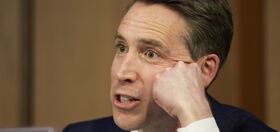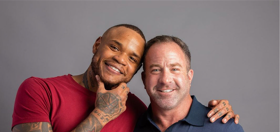
The LGBT movement, having steadily gained mainstream visibility in the U.S., is taking the fight international. But what can it really do?
In developing nations, dangling the carrot of foreign aid is an effective if not troubling tactic to affect policy. Fearing economic ramifications, Ugandan President Yoweri Museveni made a big show condemning his government’s recently passed anti-gay legislature–a bill that would make homosexual acts punishable by life imprisonment.
Don’t bust out the rainbow confetti just yet. In an open letter to the parliamentary speaker, Yoweri made it perfectly clear how he really feels about homosexuality. “You cannot call an abnormality an alternative orientation,” he writes. “It could be that the Western societies, on account of random breeding, have generated many abnormal people.” Oh, and the reason women become lesbians? “Sexual starvation,” he insisted. Okay, now.
As you might imagine, the news isn’t exactly hopeful for Ugandan gay rights advocates. Activist Pepe Julian Onziema told BBC News, “Him not assenting to the bill makes us happy,” but that, “it encourages the community to attack people like me.” And he’s not speaking in metaphor–in 2011, prominent gay rights leader David Kato was found murdered in his bed after appearing on the front page of Ugandan tabloid Rolling Stone’s (no, not that Rolling Stone) Top 100 Gays feature.
How about we take this to the next level?
Our newsletter is like a refreshing cocktail (or mocktail) of LGBTQ+ entertainment and pop culture, served up with a side of eye-candy.
Still, the potential suffering that the bill’s rejection prevents makes this a clear victory for LGBT people already living in secrecy and fear under Uganda’s harsh social climate. And for the millions like them in other economically unstable homophobic nations, the fact that leaders must balance their derogatory beliefs against self preservation will likely continue to result in improvements in quality of life.
 But globalization is a tricky beast, and aid dependence doesn’t ultimately give nations the tools to build stability. And some argue that as “developing countries have become more integrated into the world economy, and less dependent on aid,” the already dicy conditionality leverage will loosen. Which, if Uganda’s Museveni really had it his way, would mean a big fat signature on his government’s antigay bill.
But globalization is a tricky beast, and aid dependence doesn’t ultimately give nations the tools to build stability. And some argue that as “developing countries have become more integrated into the world economy, and less dependent on aid,” the already dicy conditionality leverage will loosen. Which, if Uganda’s Museveni really had it his way, would mean a big fat signature on his government’s antigay bill.
So what to do when the path to changing hearts and minds winds endlessly across generations, but so many are suffering in the here and now? Given the choice, we’ll take small victories like this one in Uganda any day, and hope that these iffy seeds of change manage to take root under the African sun.
Photo via Flickr



















robirob
The governments and companies only care for profit or natural resources like minerals, gold, diamonds, etc. Human rights get in the way when it means that voicing an opinion could cut off access to said natural resources or profits.
Human rights only matter when natural resources are up for grabs and an excuse is needed to take them by force (aka invading a country).
Stefano
@robirob : that’s America !!! In China many human rights are violated and the USA do nothing because they need them. Just look what is happening in Russia too. After the Olympics, and after USA’s perfect atheletes will have won their precious medals, we shall not hear any more of gay rights in this country, just like in China or other countries. The problem is because gays in Western societies are just small middle-class persons who only think about themselves. It is sad, but it is who we are.
Stefano
Here an interesting texte :
http://www.nationaljournal.com/gay-washington/evangelicals-are-winning-the-gay-marriage-fight-in-africa-and-russia-20140123
fagburn
Patronising simplistic Orientalist twaddle.
Stache1
Rape is a big problem in Uganda. They just don’t take it very seriously. There a very patriarchal society and don’t view their women as equals. That usually goes hand in hand with Homophobia.
Mezaien
Hoi Ugandan, HOMOS this is Cape Town, South Africa don`t give up we on your side. Love to you HOMO men and woman who fear for their lives. The USA is not better,